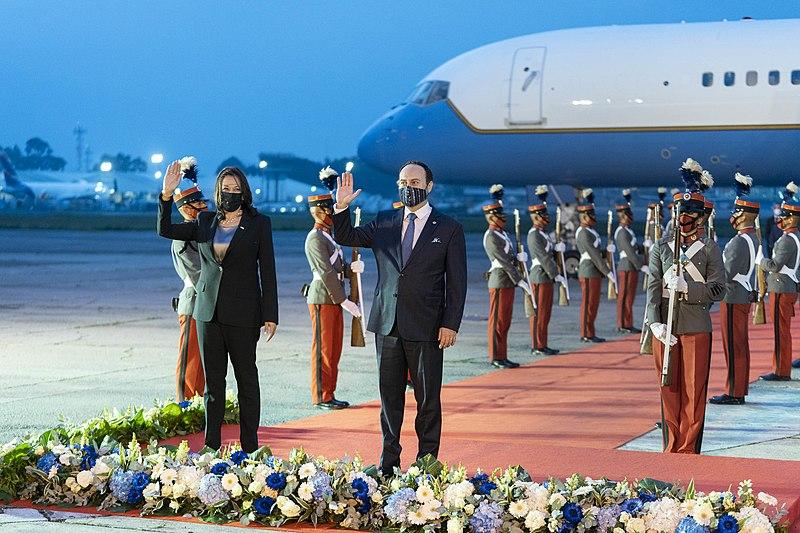Guatemala Gets No Respect From U.S. Foreign Policy Makers
American foreign policymakers, progressive allies, and NGOs demean the democracy and sovereignty of a Third World nation. Why?

VP Kamala Harris arrives in Guatemala for fact-finding mission. Wikimedia.
Due to the US-China confrontation in pursuit of global hegemony, Guatemala has become the most important country in the world for US interests. Located in the middle of North and South America and Europe and Asia, Guatemala has access to the Atlantic and the Pacific Oceans. However, the United States and the liberal international order have failed to acknowledge its importance.
US-sponsored NGOs and international media have been telling the international community that Guatemala is a rogue nation. Their narrative touts a supposed democratic backsliding in the country. Further, the narrative emphasizes that Guatemala is a corrupt country that investors should avoid. The US State Department (DOS) promotes this narrative directly and through US-financed NGOs that advocate for democracy.
Bought-Off NGOs versus Guatemala
Contrary to their façade of independent institutions, these NGOs that advocate for democracy—such as the Polity Project—rely on the US government (read: the taxpayer). The CIA finances the Polity Project, for example.
The 2010 Polity Project report on Guatemala echoed leftist narratives. These narratives include that (1) elite groups provoked Guatemala’s civil war, (2) the Guatemalan guerrillas emerged spontaneously, (3) 200,000 people died in the war, and (4) military officials created criminal cartels when they lost political power. Anyone can rebut these arguments. This CIA-sponsored report pays no attention whatsoever to US efforts during Guatemala’s counterinsurgency actions.
Freedom House (FH), another NGO that advocates for democracy, graded Guatemala a low 49 points out of 100 in its 2023 report. DOS and USAID (led by DOS) are FH’s largest funders. There are many other NGOs that portray themselves as democracy advocates but are surrogates of other agenda-driven governments and NGOs.
V-Dem has classified Guatemala as an electoral autocracy. The World Bank—whose presidency is chosen by US officials—finances V-Dem. The latter receives US funding directly through USAID and indirectly through the National Science Foundation. V-Dem also receives funding from the European Commission and other NGOs that have ties to George Soros, such as Open Society Foundations.
While operating with funds from leftist organizations, these NGOs portray themselves as leaders regarding democracy and human rights. Human Rights Watch receives funding from Bill Gates’s and Soros’s foundations. In total, they donated $100 million to the organization in 2010.
WOLA, an NGO frequently quoted by the media to explain the political situation in Guatemala, does not receive money from the United States. WOLA does, however, receive funding from US political allies such as the Norwegian and Swiss governments and other foundations linked to Soros.
This is a travesty.
From Narrative to Palpable Effects
The media and NGOs’ negative, pernicious narrative against Guatemala has had palpable consequences. In 2021, US foreign direct investment (FDI) in Guatemala was 75 percent less than in 2014 and 37 percent less than in 2019 (before the COVID-19 lockdowns). Total FDI in Guatemala steadily decreased from 2014 to 2020 when the CICIG—the UN commission against impunity in Guatemala—was at its zenith.
It is not a surprise, however, that Guatemalan FDI ended up dwindling. This is the result of US officials defaming the so-called predatory elite groups, falsely accusing the government of repressing journalists, interfering in the Prosecutor General’s Office, and excluding Guatemala from the Summit for Democracy. Despite this, Guatemala has been an ally of the United States, supporting legitimate US efforts towards promoting democracy abroad.
Guatemala has unconditionally supported Israel, Taiwan, and Ukraine. Guatemala has backed them even more than the United States, which fails to officially recognize Taiwan. While Honduras recently ended its ties with Taiwan, the Guatemalan government, in response to Honduras’s statement, restated its support for Taiwan, showing its leadership to the world.
These are important factors that the US-sponsored NGOs do not take into account when assessing and scoring Guatemala’s democracy. Guatemala does not receive the credit it deserves for supporting the international community’s causes. In fact, Guatemala is the largest country, in terms of population and GDP, that still has ties with Taiwan. Guatemala’s leadership in supporting Taiwan, in a world full of cowardly nations, has never been acknowledged.
Let Us Not Stand Idly By
Things must change. Guatemala should set conditions for its support of Taiwan to the United States and even to Taiwan.
The first condition should be for both countries to focus their infrastructure investment and aid on Guatemala. The second condition should be to increase their aid budget to 10 times what it currently is.
Guatemala is currently the most important country for the United States and China, which are battling for global hegemony. It would be counterproductive for Guatemala to ignore this reality.
Nicholas Virzi is a professor of international relations at Francisco Marroquín University in Guatemala City. He writes for Impunity Observer, where this article first appeared.